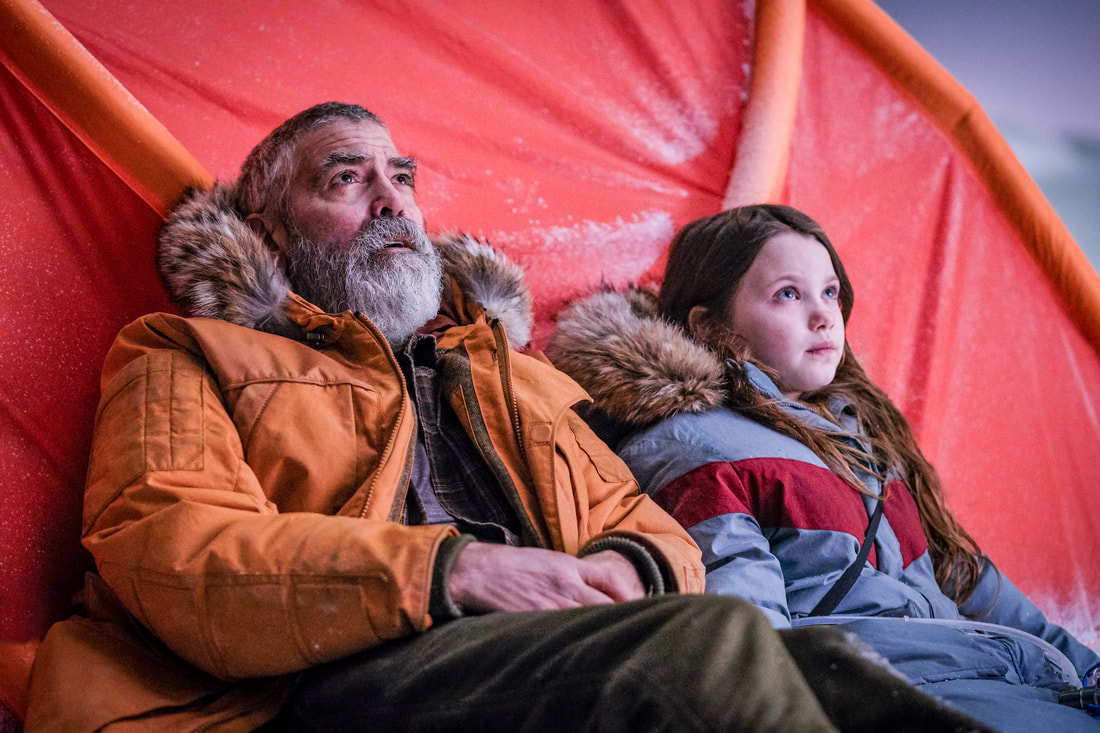|
By Nadia Dalimonte George Clooney and Caoilinn Springall in The Midnight Sky (2020) The stakes feel incredibly low in The Midnight Sky, a dull post-apocalyptic adventure story starring, produced, and directed by George Clooney. Clooney makes a cosmic return to the screen with a project that looks grand, but stumbles with the source material. Based on the 2016 book ‘Good Morning, Midnight’ by Lily Brooks-Dalton, the film follows scientist Augustine (Clooney) who discovers a young girl named Iris (Caoilinn Springall) left behind on his isolated observatory in the year 2049. As the two form an odd bond and find themselves weathering Arctic storms, a parallel thread follows a group of astronauts aboard the spacecraft Aether, headed home from a planet they hoped would be the future. But waiting for them on Earth is an ecological catastrophe threatening the livelihood of all inhabitants. Augustine tirelessly tries a poor radio connection to warn the Aether crew of the dangers ahead.
Lily Brooks-Dalton’s book has an intriguing premise dipped in loneliness and ambition. The story looks at the world’s end through the perspective of characters who are isolated, as their ambitions carry them to a life detached from Earth. Augustine is a celebrated astronomer who has given most of his life to observing the origins of the universe from remote outposts. The beginning of the film introduces him at his current posting, a snowy Barbeau Observatory in the Arctic Circle, of which he’s a terminal patient. Upon the news of a global catastrophe, while the other scientists evacuate, he stays behind in declining health and unrelenting dedication to his work. It’s an incessant ambition Augustine is evidently used to; in hazy flashback scenes of his younger self (Ethan Peck), his partner Jean (Sophie Rundle) urges that he take control of his life otherwise he will lose human connection. There are pangs of regret to Clooney’s character that the actor plays well; he doesn’t have to say much to get the feeling across, as his somber portrayal of Augustine has a lived-in quality to it. The Midnight Sky has potential on the surface, particularly as a character portrait of loneliness and longing for universal truths through confessions of a lonely mind. But what makes the premise intriguing gets lost in muddled storytelling. Mark L. Smith’s adapted screenplay flickers through plot points without the patience to let them flourish. As a consequence, moments of heightened emotion and moving scenes between the characters fall flat. There are two main threads to this film, and the parallels are drawn poorly from inception all the way to a puzzling ending. Augustine and Iris have a mostly quiet relationship; her appearance in the film is a sudden revelation for him. A reminder of someone he loves dearly. The two eventually find a way of communicating that works. As they brace the blistering elements to find another radio connection, a parallel story follows the group of astronauts aboard the isolated Aether traveling back home. The Aether crew is played by a star-studded cast including Felicity Jones, David Oyelowo, Kyle Chandler, Tiffany Boone, and Demián Bichir. With this much talent in one setting, it is especially disappointing that the screenplay (mainly the character development) are what bring the film down several notches. Each have good little standout moments throughout, but the lack of focus in storytelling trickles down to their performances as they try to elevate above an incoherent screenplay. Moments of emotional engagement feel few and far between in The Midnight Sky. Clooney’s direction is fine; there are some lovely celestial scenes that reflect and compliment Augustine’s frame of mind in particular. He establishes a strong setting of isolation in the Arctic; interrupting the quiet atmosphere are some messy action sequences that appear on screen in mostly jarring ways, and feel strategically placed simply to incorporate tension. Alexandre Desplat, who usually delivers, adds a super sentimental soundtrack to the story. There are also some jumpy musical notes that often don’t gel with certain moments. From a technical standpoint, the film is hit or miss throughout. For every moment of spectacle, there is one of distracting visual effects. At the heart of The Midnight Sky is a group of isolated individuals trying to find their way home. There is potential for an emotional impact here but it never reaches the surface. Clooney brings ambition to the film by drawing parallels between the two storylines. By the end of its 2 hour runtime, however, it becomes clear that not enough patience was implemented along the way for all the threads to truly come together in a coherent or engaging way.
1 Comment
|
Archives
June 2024
Categories |


 RSS Feed
RSS Feed